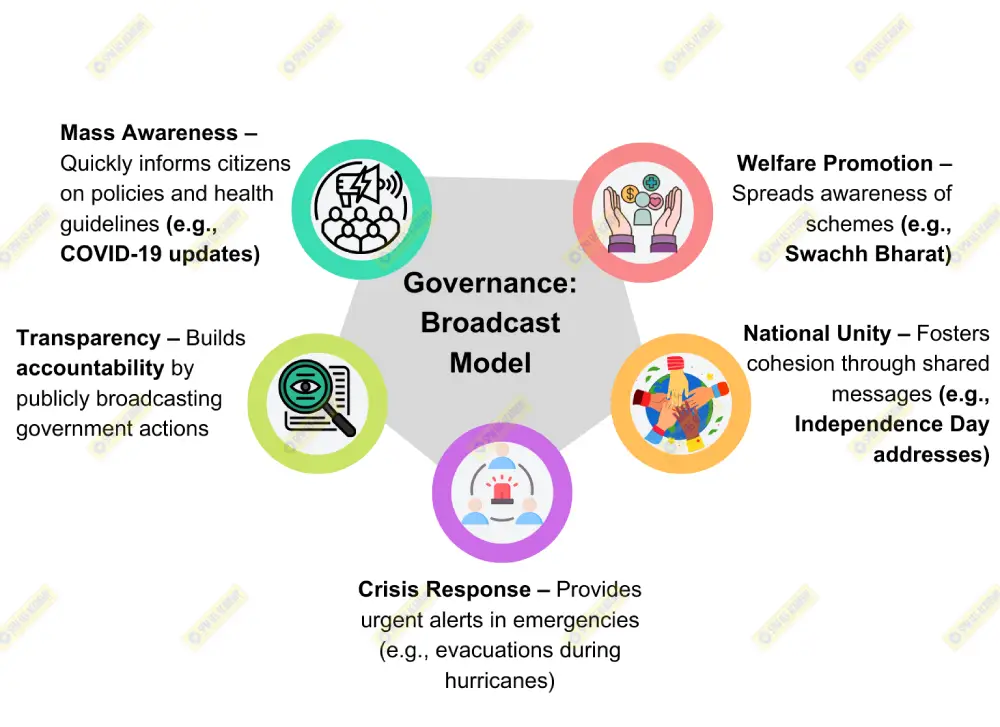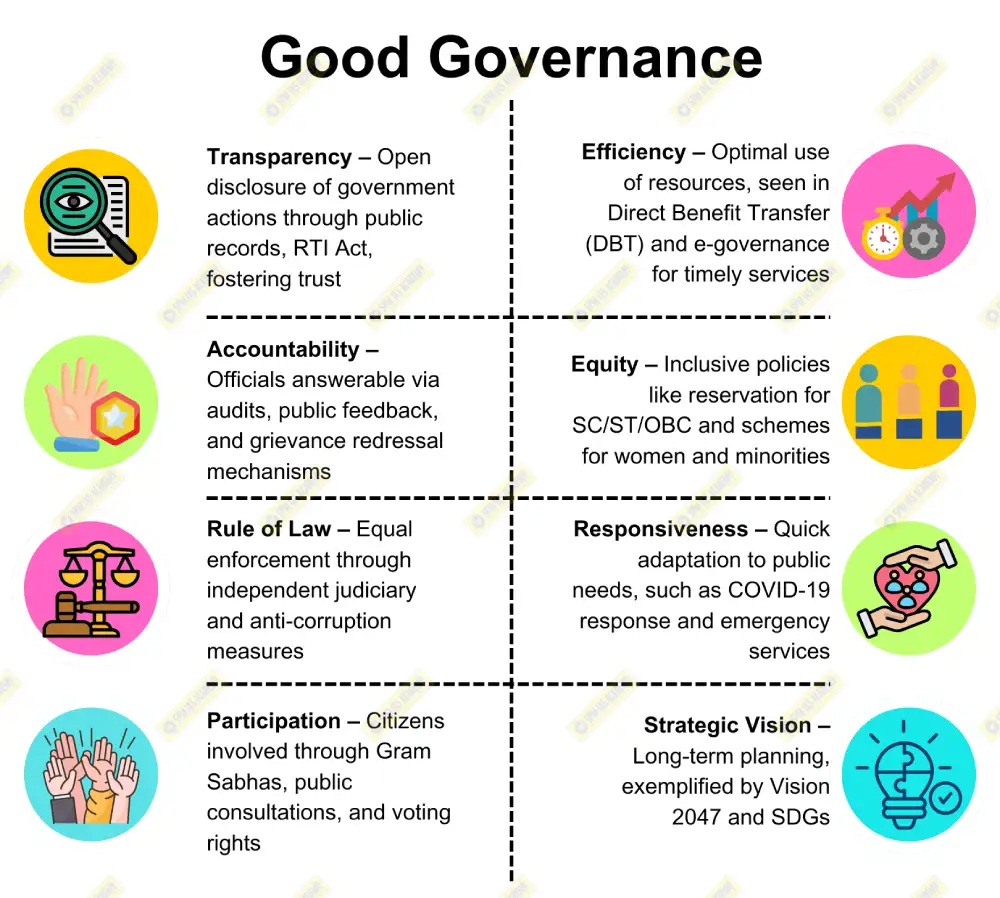The ‘Mann Ki Baat’ programme, launched by Prime Minister Narendra Modi in 2014, is a monthly radio broadcast aimed at engaging directly with the citizens of India. It serves as a platform to address social, economic, and cultural issues, and to foster collective action toward national development. The programme embodies core principles of participatory governance, transparency, and citizen engagement by creating a direct line of communication between the government and the people. Through ‘Mann Ki Baat,’ PM Modi educates, guides, and motivates citizens on issues critical to India’s development agenda.
Role of ‘Mann Ki Baat’ in Educating, Guiding, and Motivating Indians
1. Promoting Social Awareness and Responsibility
- ‘Mann Ki Baat’ regularly highlights important social issues and encourages citizens to adopt positive practices. For instance, PM Modi has frequently addressed issues such as sanitation (Swachh Bharat), environmental conservation, water conservation (Jal Shakti Abhiyan), and anti-plastic campaigns. This has helped raise awareness and spur action across India, particularly among rural communities who may have limited access to information on these issues.
- For example, the call to eliminate single-use plastic led to widespread grassroots movements, with citizens and municipalities initiating local plastic collection drives. This reinforces the concept of collaborative governance, where citizens become stakeholders in implementing policies.
2. Encouraging Digital and Financial Literacy
- PM Modi has used the platform to push for Digital India initiatives and financial inclusion, promoting digital literacy and the use of digital payment systems, particularly in rural areas. Through ‘Mann Ki Baat,’ citizens were encouraged to adopt UPI-based digital transactions, facilitating India’s transition to a digital economy.
- During the COVID-19 pandemic, the Prime Minister emphasized digital education tools for students and promoted the Diksha platform, which supports teachers and students with digital resources. This aspect aligns with good governance principles by fostering inclusivity and empowering marginalized communities with digital access.
3. Empowering Women and Promoting Gender Equality
- A recurring theme in ‘Mann Ki Baat’ has been women’s empowerment. PM Modi has discussed initiatives like Beti Bachao Beti Padhao and the importance of girls’ education, health, and sanitation. By celebrating real-life stories of women achievers, he has encouraged more women to pursue careers in science, sports, and entrepreneurship, transforming public perception and encouraging greater female participation in the workforce.
- In a recent episode, he highlighted the success of Self-Help Groups (SHGs), which are key to empowering rural women economically. By showcasing stories of SHG members who have become entrepreneurs, the program motivates others to explore similar pathways to self-reliance and economic independence, contributing to inclusive growth.
4. Environmental Stewardship and Climate Awareness
- ‘Mann Ki Baat’ has been instrumental in promoting environmental consciousness. PM Modi’s discussions on water conservation through the Jal Shakti Mission and the need for afforestation reflect his approach to integrating sustainability into governance.
- For instance, after urging citizens to plant trees and conserve water, there was an increase in local-level initiatives where communities participated in planting drives and rainwater harvesting projects. This aligns with the sustainable development goals and encourages citizens to take ownership of environmental issues, reinforcing citizen-centric governance.
5. Celebrating India’s Cultural Heritage and Diversity
- Through ‘Mann Ki Baat,’ PM Modi has often celebrated India’s cultural diversity, traditional knowledge, and crafts, which foster a sense of national pride and unity. Recently, he discussed the National Handloom Day and encouraged citizens to support local artisans by buying handloom products, strengthening the Vocal for Local initiative.
- By recognizing regional festivals, traditional art forms, and languages, the programme fosters a more inclusive national identity, bridging regional divides. This celebration of diversity supports cultural governance, fostering respect and preservation of India’s rich cultural heritage.
6. Public Health Awareness and COVID-19 Response
- During the COVID-19 pandemic, ‘Mann Ki Baat’ served as a crucial platform to promote health protocols, encourage vaccination, and combat misinformation. PM Modi highlighted the importance of wearing masks, maintaining hygiene, and following lockdown protocols, which helped in spreading accurate information across socio-economic groups.
- The program also acknowledged and celebrated the efforts of frontline workers, further motivating healthcare providers and community volunteers. By sharing stories of resilience and innovation, the Prime Minister used ‘Mann Ki Baat’ to inspire hope, resilience, and community participation, demonstrating responsive and accountable governance.
Impact and Criticisms of ‘Mann Ki Baat’
- Fostering Civic Participation: By addressing citizen contributions and showcasing grassroots efforts, the program fosters civic participation and encourages individuals to take active roles in social change. Each episode often features initiatives by ordinary citizens, demonstrating how individuals can contribute to national development, thereby promoting a bottom-up approach to governance.
- Building Trust and Transparency: ‘Mann Ki Baat’ enables the Prime Minister to communicate government policies and address citizen concerns directly, which can enhance transparency and accountability. By recognizing the issues faced by various communities and addressing them publicly, the program strengthens public trust in governance.
- Potential for Political Messaging: Critics have also noted that the platform, being government-owned, may sometimes be perceived as a medium for promoting government achievements rather than fostering an inclusive dialogue. Nonetheless, the focus on citizen-centric topics largely maintains its relevance as a tool for social motivation rather than political messaging.
In conclusion, ‘Mann Ki Baat’ has become a transformative tool in Indian governance by educating, guiding, and motivating citizens to participate actively in national development. Its emphasis on social issues, cultural identity, digital and financial inclusion, environmental sustainability, and public health reflects a governance model that values inclusivity, transparency, and participatory governance. As Prime Minister Modi himself remarked, “Mann Ki Baat is not about the government but about the people of India,” underscoring the program’s goal of creating a people-driven governance model.














